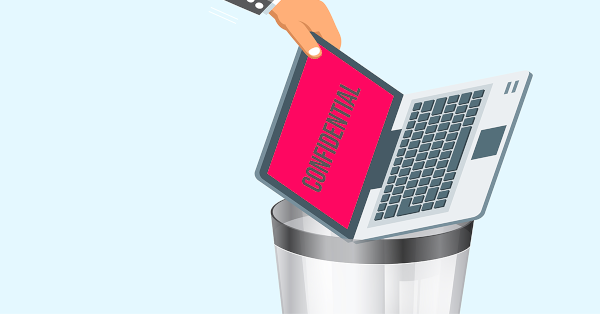 When we accidentally delete something, it feels like the end of the world. If a client file or your latest proposal is deleted, you may have to start again. Yet deleting files may not as permanent as many think. When it comes to destroying data properly, you will need to take a more thorough approach. Continue reading
When we accidentally delete something, it feels like the end of the world. If a client file or your latest proposal is deleted, you may have to start again. Yet deleting files may not as permanent as many think. When it comes to destroying data properly, you will need to take a more thorough approach. Continue reading
Tag Archives: secure disposal
How to Securely Dispose of Your Old Computers

Getting new computers for your business is exciting, but what do you do with the old ones? Sometimes they may get handed down to another staff member, re-purposed for another function, sold or even thrown out.
The problem is that there is sensitive data on them. There are passwords, emails, account numbers, license keys, client details, financial information, browser history…. the works! Every computer contains a treasure trove of sensitive information that cyber criminals would love to get their hands on!
Deleting all the files on the computer doesn’t actually make them disappear, nor does waving a strong magnet over the drive. These mistakes have cost businesses millions of dollars over the years.
Most businesses and users are unaware that specialized data deletion and cleanup is necessary. A 2016 experiment proved just how dangerous the situation can be. Researchers bought 200 used hard drives and found that 67% held unwiped, unencrypted sensitive data, including sales projection spreadsheets, CRM records, and product inventories. Even more frighteningly is that they didn’t need any special hacking skills to get this data – it was all right there on the hard drives, easily readable and helpfully labelled. It is also not surprising that with simple data recovery tools, people have also been able to access medical records, financial info and even defence related data, all waiting patiently on a discarded hard drives.
Why deleting files doesn’t help
Data on a hard drive is stored like a book with an index. Every time data is written, a quick entry is written into the index so when you need it again, it knows where to look on the hard drive. The index is used for files you create as well as system files you can’t even see. If you delete a file it is more like changing the index to say nothing is on page 10 and you can write something else there when you are ready. But if you manually go to page 10, you will find the information is still there. The file still exists until it’s been written over – it is just the index reference that is deleted when you “delete” a file.
Wiping data before disposal
There are specialised software tools you can get to properly wipe the hard drives yourself, as well as dedicated security firms, but your best option is to choose an IT business you know and trust. With that in mind, a methodical approach is required to ensure not a single drive is left untreated. You don’t want to leave data behind, or even clues that a motivated person could extrapolate any information from. The approach might include using checklists to maintain security, or dedicated processes to guide each step in decommissioning. Records should also be kept, including who signs off on completion of the retirement and where the computers are sent afterwards. A proper inventory and auditing process may slow the roll-out of your new computers, but it is always better than having your old data coming back to haunt you.
If you are located in Adelaide or the surrounding area we can migrate any needed data to your new systems and then securely destroy your old hard drives for you. We can then dispose of the computer for you via a recycling centre.
Upgrading your business computers should be an exciting time for you and your employees, so with a little forward planning, you’ll be able to keep everyone smiling and all your data secure.
Need help with your old hardware? Contact us today on 08 8326 4364 or at
su*****@dp*********.au
so that we can securely dispose of your old equipment.
